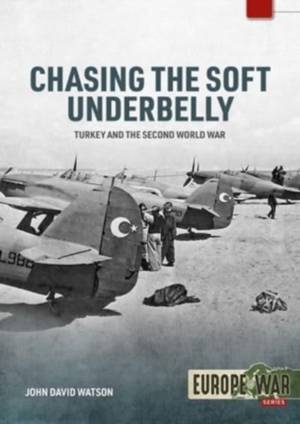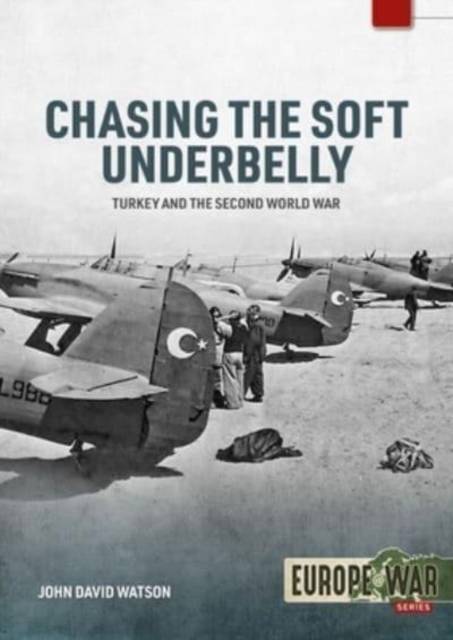
- Retrait gratuit dans votre magasin Club
- 7.000.000 titres dans notre catalogue
- Payer en toute sécurité
- Toujours un magasin près de chez vous
- Retrait gratuit dans votre magasin Club
- 7.000.0000 titres dans notre catalogue
- Payer en toute sécurité
- Toujours un magasin près de chez vous
Description
Chasing the Soft Underbelly examines the role of Turkey during the Second World War. While it was non-belligerent until February 1945, there were many attempts to push it into the conflict.
Studies of the Second World War traditionally begin with the rise of Hitler and the failure of the Western democracies to challenge fascism. Important though these events were, Turkey and the Balkans played a crucial role at key moments during the conflict. Hitler understood Germany's need for the natural resources of the Balkans, whilst Turkey was also important to Stalin, who saw the Straits as a route into the Black Sea and the Soviet Union.
Churchill was another key player whose interest in Turkey went back to the Gallipoli campaign of the First World War. This was an interest, some might say, an obsession, which he maintained during the interwar years and throughout the Second World War. The 'soft underbelly' was his shorthand for attacking Germany through Turkey and the Balkans. While Turkey is typically a footnote in most histories of the Second World War, it featured highly in the strategies of the combatants. This book explores those strategies based on primary and secondary sources. It starts with examining Turkey before the war and the threats and opportunities it faced. This includes a chapter on the Turkish armed forces and their preparedness for war.
The rest of the book takes the reader chronologically through the war, outlining the various plans of the combatants as they impacted Turkey. These reflected the war's progress as it raged around Turkey's borders and on occasion, within it. It also outlines how the Turkish armed forces developed during the war as they obtained equipment and training from both sides.
Despite Britain being the driving force on the Allied side in the failed efforts to get Turkey to declare war, they did keep Turkey out of the Axis camp, which would have had severe military consequences in 1939-41. The Turkish leadership played a skilful diplomatic and military game to maintain their non-belligerent status, although at a considerable economic cost. Other than in 1942, at the height of the Axis tide, Turkey faced mainly in the direction of the Allies whilst always worried about the Soviet Union. That concern came to a head as the Red Army arrived on their European border in 1944.
Studies of the Second World War traditionally begin with the rise of Hitler and the failure of the Western democracies to challenge fascism. Important though these events were, Turkey and the Balkans played a crucial role at key moments during the conflict. Hitler understood Germany's need for the natural resources of the Balkans, whilst Turkey was also important to Stalin, who saw the Straits as a route into the Black Sea and the Soviet Union.
Churchill was another key player whose interest in Turkey went back to the Gallipoli campaign of the First World War. This was an interest, some might say, an obsession, which he maintained during the interwar years and throughout the Second World War. The 'soft underbelly' was his shorthand for attacking Germany through Turkey and the Balkans. While Turkey is typically a footnote in most histories of the Second World War, it featured highly in the strategies of the combatants. This book explores those strategies based on primary and secondary sources. It starts with examining Turkey before the war and the threats and opportunities it faced. This includes a chapter on the Turkish armed forces and their preparedness for war.
The rest of the book takes the reader chronologically through the war, outlining the various plans of the combatants as they impacted Turkey. These reflected the war's progress as it raged around Turkey's borders and on occasion, within it. It also outlines how the Turkish armed forces developed during the war as they obtained equipment and training from both sides.
Despite Britain being the driving force on the Allied side in the failed efforts to get Turkey to declare war, they did keep Turkey out of the Axis camp, which would have had severe military consequences in 1939-41. The Turkish leadership played a skilful diplomatic and military game to maintain their non-belligerent status, although at a considerable economic cost. Other than in 1942, at the height of the Axis tide, Turkey faced mainly in the direction of the Allies whilst always worried about the Soviet Union. That concern came to a head as the Red Army arrived on their European border in 1944.
Spécifications
Parties prenantes
- Auteur(s) :
- Editeur:
Contenu
- Nombre de pages :
- 92
- Langue:
- Anglais
- Collection :
Caractéristiques
- EAN:
- 9781804510261
- Date de parution :
- 17-04-23
- Format:
- Livre broché
- Format numérique:
- Trade paperback (VS)
- Dimensions :
- 218 mm x 290 mm
- Poids :
- 340 g

Les avis
Nous publions uniquement les avis qui respectent les conditions requises. Consultez nos conditions pour les avis.






